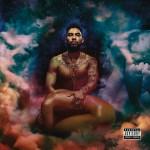
Miguel Wildheart
(RCA)
There really is such a thing as being in the right place at the right time. Miguel released his second album, Kaleidoscope Dream, just a few weeks after Frank Ocean’s Channel ORANGE. Come the end of 2012, Channel ORANGE was sitting near the top of countless album of the year lists, and alternative R&B – a meaningless genre classification if ever there was one – was the sound of the future. Since then, The Weeknd has broken through into the mainstream, Drake seems to get bigger by the day, and even artists like Shamir and Vince Staples are starting to make waves. Thanks to influences outside of his control, a new Miguel record is now a big deal.
Presumably, Miguel himself knows the gravity of the situation, as for album number three, he’s kicked the ambition up a notch. Kaleidoscope Dream was a solid record with plenty of above-average tunes, but it didn’t take many risks. On Wildheart, Miguel looks to live up to the album title by pushing the boundaries further and taking R&B in directions it hasn’t been for quite some time, namely towards rock.
As soon as you start combining rock guitars with R&B vocals, it’s only a matter of time before the elephant in the room of Prince is mentioned. Miguel is clearly a big fan of His Royal Purpleness (disclaimer: it’s mandatory for all music writers to give Prince nicknames like this; it’s in our equivalent of the Hippocratic Oath). Musically, we’re in Purple Rain territory: slow guitars, patient build-ups and epic power ballads. Thematically, it’s more along the lines of songs like Darling Nikki and Gett Off, i.e. absolute filth.
Wildheart starts quite inauspiciously with the chug of A Beautiful Exit. It’s a brave strategy and, although pealing riffs and honeyed vocals later in the track take it more into traditional Miguel territory, the dry and muted accompaniment to following song, DEAL, let you know he’s not going to be typecast.
Anyone who has followed the career of Miguel will know he’s not exactly backwards in coming forwards to talking about sex. As a British critic, it’s a little difficult to pass judgement on, because our R&B tradition rarely focusses on it in as explicit a fashion as our American counterparts. Of course, there’s a place for it and it can be done brilliantly (Beyoncé). However, it usually ends up being either hilariously bad (R Kelly) or just plain uncomfortable (A$AP Rocky).
Miguel manages to tick all those boxes. Most of his sex lyrics just sound tired and the kind of thing we’ve heard millions of times before. The fact that the Destinado A Morir interlude is subtitled (Enter.Lewd) isn’t going to make anything rise to attention but your eyebrows. Still, that’s a relative picnic in comparison to The Valley: a dead-eyed examination of a joyless coupling that appears as mechanical as the arrangement that accompanies it. Even Miguel himself sounds bored as he goes through the motions of this choreographed coupling, which seems to be entirely lacking in intimacy and about as erotic as Artexing a ceiling.
Perhaps The Valley is the sacrificial lamb, because its ugliness only serves to highlight the brilliance of the track that follows it, Coffee. Over a warm and satisfying arrangement, Miguel outlines beautiful metaphors and a deep, loving relationship in the way that only his vocals can. It’s poetry, and manifestly the best thing Miguel has ever done. The detail and nuances in the lyrics (“We talk street art and sarcasm / Crass humour and high fashion”) highlight the connection all people in relationships will recognise and, even though there is talk of “Drugs, sex and Polaroids”, it’s still held together with a strong feeling of romance.
Elsewhere, Miguel’s voice is the real star. There’s nothing immediately remarkable about it, but it imparts a degree of emotion and feeling that few other vocalists can match. It’s a good job really, because the longer Wildheart goes on, the more that voice is needed to add something to otherwise uninspiring productions. It’s likely Miguel made the singing centre-stage on purpose – he’s spoken about how the album is about feeling out of place and the sensation of not belonging – but even though artists should often play to their strengths, it comes off as narcissistic.
In one sense, Miguel should be given some sort of acclaim for not simply making Kaleidoscope Dream II, when it would surely have been a commercial success. However, in attempting to avoid being part of a scene, the paucity of ideas becomes stark. Wildheart impresses in parts, and Miguel’s vocals are a thing to behold. For the most part, however, it’s a record that struggles to fully hold your attention.
31 July, 2015 - 11:47 — Joe Rivers